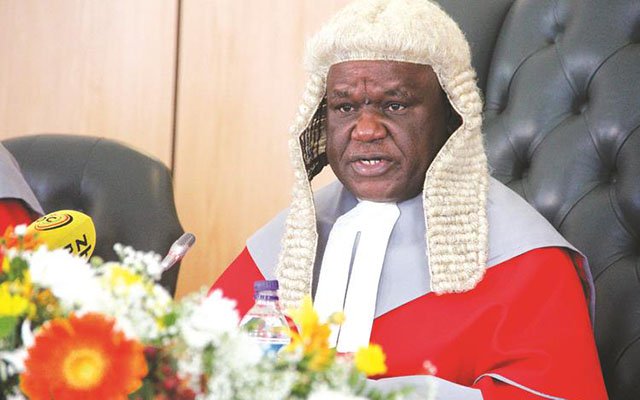By Andrew Kunambura
The Constitutional Court (Con-Court) has agreed to hear, on an urgent basis, a legal challenge to government’s decision to bar expatriate Zimbabweans from voting from their foreign bases in the forthcoming key 2018 vote.

Chief Justice Luke Malaba ruled that a judicial review application lodged over whether government has the power to bar Zimbabweans not resident in the country from voting in the 2018 presidential, parliamentary and municipal polls was urgent.
In terms of the Con-Court’s rules, a litigant first gets permission to approach it.
The case has been brought on behalf of human rights lawyer Gabriel Shumba, who lives in exile in South Africa, Sibonile Mfumisi, also resident in South Africa, and Darlington Nyambiya, who is living and working in the United Kingdom, by the Zimbabwe Lawyers for Human Rights (ZLHR).
The rights lawyers argue that the country’s Constitution, which came into force in 2013, guarantees the right to vote for all citizens.
Justice minister Ziyambi Ziyambi, the Zimbabwe Electoral Commission (Zec) acting chair Emmanuel Magade, Foreign Affairs minister Sibusiso Moyo, Finance minister Patrick Chinamasa and Attorney- General Prince Machaya are cited as respondents.
The application was heard in chambers.
Top lawyer Thabani Mpofu told the Daily News yesterday that the case will now be heard on February 7.
“The application for direct access was granted with no order as to costs,” Mpofu said.
“In views of the importance of the matter and taking into account its urgency, the chief justice directed that it be heard on an expedited basis.
“To that end, the substantive matter will be heard on the 7th of February 2018.”
According to court papers, the applicants argued that Section 67 (3) of the Constitution states that: “Every Zimbabwean citizen who is of or over 18 years of age has the right to vote in all elections and referendums to which this Constitution or any other law applies, and to do so in secret.”
They further argued that some provisions of the Electoral Act prevent Zimbabwean citizens living and working outside the country from exercising their right to vote unless they are able to physically come to Zimbabwe to vote.
“Respondents should be ordered to put in place all appropriate measures to enable the applicants’ registration and participation in the 2018 … elections as voters,” the application reads.
At least more than 3 million Zimbabweans are living outside the country following a debilitating economic and political situation.
But those in the Diaspora said they are still entitled to make an input in the running of the country’s affairs, including the right to vote.
“I regularly send remittances to relatives who remain in Zimbabwe.
“I was heartened to note that in terms of the Zimbabwe Diaspora Policy, the government acknowledges that the Zimbabwe Diaspora wishes to be engaged as active citizens in national dialogue and affairs as they bring international exposure and lessons to the table.
“I also continue to have a vested interest in the electoral processes of my country, and keenly monitor events back home,” Shumba said in an affidavit.
The litigants are specifically seeking a Con-Court verdict on sections 23 and 71 of the Electoral Act, which they argue are ultra vires the Constitution.
Section 23 (3) of the Electoral Act (Part V on residence qualifications of voters and registration) states that “a voter who is registered on the voters’ roll for a constituency, other than a voter who has been registered in that constituency in terms of the proviso to subsection shall not be entitled to have his or her name retained on such roll if, for a continuous period of twelve months, he or she has ceased to reside in that constituency”. Daily News






